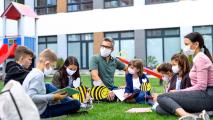
Biotech
Human history has been all but defined by death and disease, plague and pandemic. Advancements in 20th century medicine changed all of that. Now advancements in 21st century medicine promise to go even further. Could we bring about an end to disease? Reverse aging? Give hearing to the deaf and sight to the blind? The answer may be yes. And soon.
More
Immune signals may predict severe cases of COVID-19
Severe cases of COVID-19 involve a runaway immune response called a cytokine storm. Immune system “signatures” may sharpen doctor’s forecasts.
Human-like "organ chips" could eliminate animal studies
To rapidly test for COVID-19 treatments without animal studies, researchers make a model human body out of “organ chips.”
Gene therapy gives hope for duchenne muscular dystrophy
A boy received the first gene therapy trial for Duchenne muscular dystrophy and is able to walk once again.
Coronavirus treatment update: Where we stand today
Our latest coronavirus treatment update highlights the options that appear to work, ones that might, and ones that failed to live up to their promise.
New blood test for Alzheimer’s is as accurate as brain scans
A new blood test for Alzheimer’s is as accurate as the costly, invasive, and time-consuming methods currently used to detect the disease.
Scientists test DIY coronavirus vaccine on themselves
Scientists have developed a DIY coronavirus vaccine they think could provide protection against COVID-19 — and they’re testing it on themselves.
COVID-19 tests that are fast, cheap, and less accurate may be key
Fast, cheap, DIY COVID-19 tests could dramatically increase the amount of testing done. And some experts think the trade off in accuracy would be worth it.
A new way to promote bone healing, inspired by LEGO blocks
Drawing inspiration from LEGO blocks, researchers have created a new type of scaffold to facilitate better bone healing and soft tissue repair.
This genetically modified cow could transform beef production
Cosmo the bull calf has an extra SRY gene, which makes him more likely to sire male cows — and also makes him a strong candidate for use as a GMO food.
Small protein, big breakthrough for CRISPR gene editing
A new protein opens doors for gene editing by gaining access to hard-to-reach areas of the genome.
New blood test for cancer could lead to earlier diagnoses
A new blood test for cancer that can detect the disease four years before symptoms appear could one day be used as a routine cancer screening tool.
Scientists organize concert to study COVID-19 transmission
To better understand the potential for COVID-19 transmission at live events, scientists are organizing a free concert by pop singer Tim Bendzko.
Inhaled coronavirus drug shows promise in small trial
An inhaled coronavirus drug containing interferon beta decreased patients’ chances of becoming severely ill by 79%, according to its creator.
The case for teaching students outside this fall
Transitioning to outdoor classrooms this fall could help stem the spread of COVID-19 in schools and protect students, according to researchers.
Remote therapy is as effective as face-to-face, for depression
The pandemic has therapists’ couches off limits. A new study finds that remote therapy may be as effective for depression as face-to-face, so I gave it a try.
Oxford COVID-19 vaccine triggers strong immune response
An Oxford COVID-19 vaccine triggered the creation of antibodies and T cells in trial participants, according to promising results published in The Lancet.
Doctors debate over using radiation therapy for COVID-19
Citing evidence from the past and recent, small trials, some doctors are calling for low-dose radiation therapy for COVID-19 patients. Controversy has followed.
New NFL mouth shield could protect players from COVID-19
The NFL’s mouth shield is designed to stop respiratory droplets. But player’s reactions have been mixed.
How to explain falling COVID-19 mortality rates
COVID-19 mortality rates are dropping in the U.S. and other nations — a few theories explain why more people are surviving the coronavirus.
"T cells" could provide immunity after antibodies fade
T cells that combat SARS-CoV-2 have been discovered in people who never had COVID-19, potentially putting natural herd immunity within our grasp.
Subscribe to the newsletter































